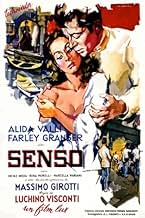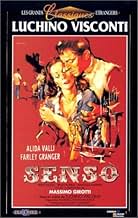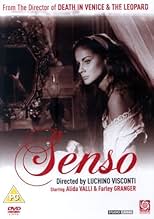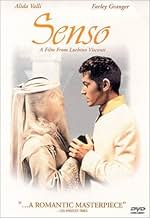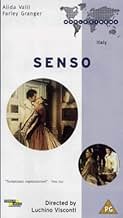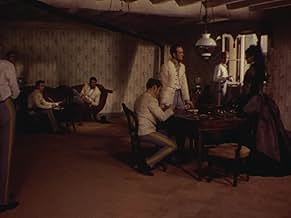Senso
- 1954
- Tous publics
- 2h 3m
IMDb RATING
7.4/10
9.3K
YOUR RATING
An Italian Countess is allied with Nationalists during the Italian-Austrian war of unification. However, she risks betraying their cause when she falls in love with an Austrian lieutenant.An Italian Countess is allied with Nationalists during the Italian-Austrian war of unification. However, she risks betraying their cause when she falls in love with an Austrian lieutenant.An Italian Countess is allied with Nationalists during the Italian-Austrian war of unification. However, she risks betraying their cause when she falls in love with an Austrian lieutenant.
- Awards
- 3 wins & 2 nominations total
Franco Arcalli
- Un soldato
- (uncredited)
Aldo Bajocchi
- Un soldato
- (uncredited)
Ottone Candiani
- Un soldato
- (uncredited)
Nando Cicero
- Un soldato
- (uncredited)
Claudio Coppetti
- Un soldato
- (uncredited)
Cristoforo De Hartungen
- Il generale Hauptmann
- (uncredited)
Tony Di Mitri
- Un soldato
- (uncredited)
Featured reviews
A feast for the eyes this lush melodrama may be an acquired taste for some but I doubt anyone could say it wasn't visually stunning. Venice is rendered so beautifully you will want to hop the next flight there and with the composition of all the other scenes it is like watching a story take place inside of paintings. However as gorgeous as all that is it also can be distracting and take you out of the story as you study the detail which at times feels a bit surreal. Having only seen Alida Valli in her English language films where she often seemed stiff and ill at ease her performance here is quite a revelation. She is fully in command of the screen and her anguished turmoil is compelling to watch. Farley is not bad although his part really doesn't offer him much more than being a slick and very handsome wastrel.
This has to be one of my all time old favorite Romantic Motion Picture.
Visconti brings about Magic and beauty onscreen making every shot a glamour in experience!
There are so many great moments in Senso that it will take you ages before this Picture wears out in your memory.
Besides the fact that Visconti is one of the great Film-makers of all times it has to be said that this Director simply had a feel about shots to form a scene to imprint that exact emotion or feeling that was intended by him. He always knew to capture and captivate the viewer and bring about that special bond which nowadays we have lost with contemporary Motion Pictures!
For all out there whom enjoy the Art of Film-making, for all whom cherish good Film-making, go fetch "Senso"! It's an experience not to forget!
Senso is about the magic which comes about when a Picture finds it's way through the Projector unto the White screen! It's an experience rarely seen but so is this Art which is only understood by a handful of Film-makers!
Luchino Visconti, I thank you for this venture and understanding of the greatest Art form in this Universe!
Visconti brings about Magic and beauty onscreen making every shot a glamour in experience!
There are so many great moments in Senso that it will take you ages before this Picture wears out in your memory.
Besides the fact that Visconti is one of the great Film-makers of all times it has to be said that this Director simply had a feel about shots to form a scene to imprint that exact emotion or feeling that was intended by him. He always knew to capture and captivate the viewer and bring about that special bond which nowadays we have lost with contemporary Motion Pictures!
For all out there whom enjoy the Art of Film-making, for all whom cherish good Film-making, go fetch "Senso"! It's an experience not to forget!
Senso is about the magic which comes about when a Picture finds it's way through the Projector unto the White screen! It's an experience rarely seen but so is this Art which is only understood by a handful of Film-makers!
Luchino Visconti, I thank you for this venture and understanding of the greatest Art form in this Universe!
Senso was Visconti at his most elegant and aesthetic. It opened his series of historical spectacles. The film showed that epics and melodramas can entail political criticism as any other genres. Senso is his intelligent analysis about the Italian unification - Risorgimento. The film's criticism didn't please all the people and it suffered from censorship and it was edited several times. Nonetheless this aesthetically beautiful film still stands out as a fine ironic masterpiece.
The year is 1866 and the moment people have dreamed for decades - centuries - is in our hands. Garibaldi is coming and the Italians are beating the Austrians. In the middle of all this Visconti tells us a story about an Italian woman, who is the cousin of the leader of the underground resistance, who falls in love with an Austrian lieutenant. She is blinded by her romantic illusion and is ready to betray her family, friends, ideals and native land - these are part of the ethical problematics in Senso.
Senso was Visconti's first color film and he obviously had put a lot of effort to it. It's visually gorgeous and meant an aesthetic revolution for Italian cinema. It is no coincidence that it starts in an opera which Visconti did a lot himself too. The opening sequence shows us the basic power of Opera and melodrama - to change life, infrastructure without forgetting the concrete history.
Historical films always tell us about two different ages, intentionally or unintentionally: the one the story takes place in and the time it was made in. It's a film about the Italian unification but also a study about the deepest emotions in Italy during the 1950's. Italy after WWII, filled with neo realism - antifascist battle and hope for democracy. But also about the downside; the victory of the right-wingers and the beginning of the Cold War.
Senso is a gorgeous film which requires patience and love from its viewer. It's a political, ironic, revolutionary and aesthetic film. Truly one of the biggest landmarks in Visconti's career but also in the history of Italian cinema.
The year is 1866 and the moment people have dreamed for decades - centuries - is in our hands. Garibaldi is coming and the Italians are beating the Austrians. In the middle of all this Visconti tells us a story about an Italian woman, who is the cousin of the leader of the underground resistance, who falls in love with an Austrian lieutenant. She is blinded by her romantic illusion and is ready to betray her family, friends, ideals and native land - these are part of the ethical problematics in Senso.
Senso was Visconti's first color film and he obviously had put a lot of effort to it. It's visually gorgeous and meant an aesthetic revolution for Italian cinema. It is no coincidence that it starts in an opera which Visconti did a lot himself too. The opening sequence shows us the basic power of Opera and melodrama - to change life, infrastructure without forgetting the concrete history.
Historical films always tell us about two different ages, intentionally or unintentionally: the one the story takes place in and the time it was made in. It's a film about the Italian unification but also a study about the deepest emotions in Italy during the 1950's. Italy after WWII, filled with neo realism - antifascist battle and hope for democracy. But also about the downside; the victory of the right-wingers and the beginning of the Cold War.
Senso is a gorgeous film which requires patience and love from its viewer. It's a political, ironic, revolutionary and aesthetic film. Truly one of the biggest landmarks in Visconti's career but also in the history of Italian cinema.
Whatever Anton Bruckner had in mind when writing his majestic Seventh Symphony, it probably wasn't as the score to a postwar Italian love story set during the Italian-Austrian conflicts of the Risorgiamento. Though the use of pre-existing classical music as backdrop for films is to be discouraged, here it works in surprising ways. Alida Valli is the Countess Livia Serpieri, in a loveless marriage to an older, collaborationist official. At the opera (Venice's La Fenice during Il Trovatore!) she meets up with a dashing young Austrian officer, Farley Granger. (Digression: After a handful of American films -- They Live by Night, Rope, Side Street, Strangers on a Train -- Granger journeyed to Italy to work with Visconti then fell off the screen for years, only to resurface in a few schlock films in the late 60s and early 70s. What happened to him?) They kindle up a clandestine and dangerous affair -- the wealthy older woman and the manipulative wastrel. After wheedling a small fortune out of her to bribe a doctor who declares him unfit to serve, he dumps her. But hell hath no fury....Luchino Visconti, assisted by the young Franco Zeffirelli -- both were opera directors, too -- pulls out all the stops, ending with a finale reminiscent of Tosca (but with a twist). Senso is a shameless and unforgettable wallow in Italianate passion -- unabashed verismo translated to the silver screen.
Italy is still probably in ruins of war at this point, real or figurative, so what does this filmmaker do, Visconti? By waving his wand, he conjures up an earlier Italy, also in the throes of occupation and war, it's the last days of the Austrian occupation around Venice, but now it can all be placed in the safer distance of history, set up as operatic melodrama on a stage.
You'll see this self-referential waving of the hand in the just the opening scene. We open in an opera house in the middle of a play, with actors on stage valiantly rushing to weapons. As soon as the play is over, patriot viewers rain the place down with revolutionary pamphlets.
It is an operatic play that we see; film as opera. Up on this stage, collaboration with a regime can be safely contained in a love affair, rich countess falling for the dashing Austrian lieutenant. In the usual melodramatic passion, she risks all. The whole point of the story is to have moments like when news reach her of a battle won against the Austrians, but instead of rejoicing at liberation, she must look terrified because her beau might have been on that battlefield.
It's not something I can get excited about, nor would I recommend you go out of your way to find it, except as contrast to other, more pertinent things about how a viewer can be choreographed through space. I mean, here is a cinema of vistas and gestures. When a camera pans around a room that someone walks in, it's just this room that we see. War is suddenly introduced as a series of vistas with crowds rushing about, filmed in a disjointed way in order to convey chaos and mobilization and yet they manage to look placid and painterly.
But how about this? It ends with another self-referential note but now one that waves away illusion, dispels fiction. Having risked all, she finds out he's not the dashing hero of operas that she wanted him to be.
Up on this stage, turning your back on your countrymen is only the innocent fallout of passion, all because you maybe yearned for some of the romance of stories from the past.
You'll see this self-referential waving of the hand in the just the opening scene. We open in an opera house in the middle of a play, with actors on stage valiantly rushing to weapons. As soon as the play is over, patriot viewers rain the place down with revolutionary pamphlets.
It is an operatic play that we see; film as opera. Up on this stage, collaboration with a regime can be safely contained in a love affair, rich countess falling for the dashing Austrian lieutenant. In the usual melodramatic passion, she risks all. The whole point of the story is to have moments like when news reach her of a battle won against the Austrians, but instead of rejoicing at liberation, she must look terrified because her beau might have been on that battlefield.
It's not something I can get excited about, nor would I recommend you go out of your way to find it, except as contrast to other, more pertinent things about how a viewer can be choreographed through space. I mean, here is a cinema of vistas and gestures. When a camera pans around a room that someone walks in, it's just this room that we see. War is suddenly introduced as a series of vistas with crowds rushing about, filmed in a disjointed way in order to convey chaos and mobilization and yet they manage to look placid and painterly.
But how about this? It ends with another self-referential note but now one that waves away illusion, dispels fiction. Having risked all, she finds out he's not the dashing hero of operas that she wanted him to be.
Up on this stage, turning your back on your countrymen is only the innocent fallout of passion, all because you maybe yearned for some of the romance of stories from the past.
Did you know
- TriviaThe film opens in La Fenice, the Venice opera house. La Fenice was destroyed by arson in 1996, but reopened in 2003. Enlarged frames of this movie were used as a reference in reconstructing it.
- Quotes
Il tenente Franz Mahler: It's too late! It's over! I'm not your romantic hero!
- Alternate versionsTwo versions of the film are available on video.
- One version is missing the scene where Livia tries to explain where all the money meant for the troops went.
- Another version is missing the climatic battle sequence between the Austrian and Italian troops.
- ConnectionsEdited into Histoire(s) du cinéma: La monnaie de l'absolu (1999)
- SoundtracksSinfonia N. 7 in mi maggiore (7th Symphony)
Music by Anton Bruckner
Performed by Orchestra Sinfonica Nazionale della Rai
Conducted by Franco Ferrara
- How long is Senso?Powered by Alexa
Details
- Release date
- Country of origin
- Languages
- Also known as
- The Wanton Contessa
- Filming locations
- Teatro La Fenice, Venice, Veneto, Italy(opening scenes)
- Production company
- See more company credits at IMDbPro
Box office
- Budget
- ITL 700,000,000 (estimated)
- Gross US & Canada
- $27,723
- Opening weekend US & Canada
- $3,984
- Oct 28, 2018
- Gross worldwide
- $27,723
- Runtime2 hours 3 minutes
- Color
Contribute to this page
Suggest an edit or add missing content


![Watch Trailer originale italiano [OV]](https://m.media-amazon.com/images/M/MV5BYzc0Y2MyOGMtMzg0My00Mzc4LWIwYjItZjg1ZDhmMDZmOTlkXkEyXkFqcGdeQXRodW1ibmFpbC1pbml0aWFsaXplcg@@._V1_QL75_UX500_CR0)

